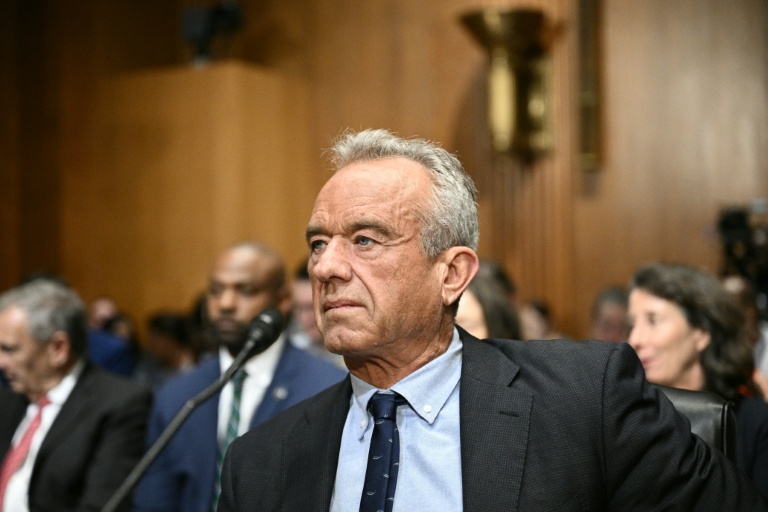Health
US Vaccine Panel Meeting Could Alter Childhood Immunization Policies

A significant meeting of the US Advisory Committee on Immunization Practices (ACIP) is scheduled for March 15-16, 2024, in Atlanta, where members will discuss potential changes to federal immunization recommendations. This meeting comes amid growing concerns that the panel, reshaped by Robert F. Kennedy Jr., may lean towards anti-vaccine sentiments, risking the integrity of established medical guidelines.
Kennedy, known for promoting vaccine misinformation, has appointed a new voting board that aligns closely with his views. This meeting could see discussions about altering the standard childhood vaccine schedule, including delaying vaccines for diseases such as Hepatitis B. Public health experts warn that any changes could have serious implications for community health across the United States.
The specific agenda items for the meeting are not publicly available, but it is anticipated that the committee will review the Covid-19 vaccine, along with the combined MMRV shot, which protects against measles, mumps, rubella, and varicella. Experts have raised alarms about the potential for increased rates of febrile seizures linked to the MMRV vaccine, further complicating the vaccine discourse.
Syra Madad, an epidemiologist, emphasized the critical importance of maintaining a robust vaccination schedule. She stated, “Vaccines have added decades of life to our life expectancy. They have helped Americans live healthier lives. Shifting the childhood vaccine schedule is like pulling bricks out of the foundation of public health.” Madad warned of the dire consequences that could arise from such changes, highlighting the potential for increased public confusion and concern among parents.
Since 2005, ACIP has recommended administering the first dose of the Hepatitis B vaccine to newborns within 24 hours of birth to prevent transmission from mothers. Kennedy and his allies have questioned the necessity of this vaccine for newborns, arguing that Hepatitis B is primarily spread through sexual contact and needles. Amesh Adalja, an infectious disease specialist at Johns Hopkins University, criticized this perspective, noting that it exploits public ignorance regarding the disease’s transmission.
The meeting’s implications extend beyond vaccine schedules. It follows the controversial ousting of the former director of the Centers for Disease Control and Prevention (CDC), who reportedly faced pressure to endorse recommendations that lacked scientific backing. This incident has led to a series of resignations within the agency, raising questions about the future direction of vaccine policy in the US.
In response to potential shifts in federal recommendations, several Democratic-led states in the West have proactively issued guidance encouraging residents to receive both the Covid-19 and flu vaccines. This response highlights a growing concern about a patchwork approach to public health, as states navigate their own policies in the face of federal uncertainty.
Madad expressed frustration over the current state of affairs, stating, “I am worried about the patchwork that it’s causing across the United States.” As the ACIP convenes, the outcome may significantly influence public health strategies and perceptions of vaccination across the nation.
-

 Lifestyle3 months ago
Lifestyle3 months agoLibraries Challenge Rising E-Book Costs Amid Growing Demand
-

 Sports3 months ago
Sports3 months agoTyreek Hill Responds to Tua Tagovailoa’s Comments on Team Dynamics
-

 Sports3 months ago
Sports3 months agoLiverpool Secures Agreement to Sign Young Striker Will Wright
-

 Lifestyle3 months ago
Lifestyle3 months agoSave Your Split Tomatoes: Expert Tips for Gardeners
-

 Lifestyle3 months ago
Lifestyle3 months agoPrincess Beatrice’s Daughter Athena Joins Siblings at London Parade
-

 World3 months ago
World3 months agoWinter Storms Lash New South Wales with Snow, Flood Risks
-

 Science3 months ago
Science3 months agoTrump Administration Moves to Repeal Key Climate Regulation
-

 Science2 months ago
Science2 months agoSan Francisco Hosts Unique Contest to Identify “Performative Males”
-

 Business3 months ago
Business3 months agoSoFi Technologies Shares Slip 2% Following Insider Stock Sale
-

 Science4 months ago
Science4 months agoNew Tool Reveals Link Between Horse Coat Condition and Parasites
-

 Sports3 months ago
Sports3 months agoElon Musk Sculpture Travels From Utah to Yosemite National Park
-

 Science4 months ago
Science4 months agoNew Study Confirms Humans Transported Stonehenge Bluestones









